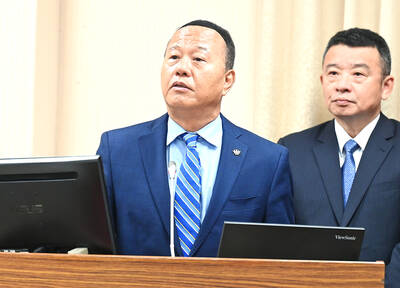It tops the list of the nation's most instantly recognizable songs, but starting next month Mariden's Prayer will have company.
The Environmental Protection Agency (EPA) has signed up Any Empty Bottles for Sale? (
In addition, a rock version of the 20-year-old local favorite, arranged by Harlem Yu (庾澄慶), will be played at hundreds of fast-food chain stores across the country starting from next Tuesday.
The two artists agreed to allow the EPA to use their work for free.
"It's my pleasure to do so," Hou said yesterday at a press conference organized by the EPA. "The level of civilization in a country can partly be judged by reviewing its achievements in environmental protection."
In 1983, Hou married a segment of a Taiwanese slogan commonly used by recycling service peddlers to a major pentatonic scale, the basic scale of Chinese music. The song turned out to be one of Hou's best-loved pieces. Over the past two decades, the song has been translated into a number of different languages, including French and Japanese.
EPA Administrator Hau Lung-bin (
Hau said the rock arrangement will be played at 600 fast-food chain stores, where more trash cans will be installed for customers to recycle leftovers and paper containers.
Hau said the 400 million customers visiting fast-food chain stores annually were the target of the EPA's environmental education program.
"The six-month trial will be an ideal model of the cooperation between the government, the industry and the public to practice recycling on a daily basis," Hau said.
Hau said the recycling push is part of a follow-up to the EPA's policy of limiting the use of plastic bags and disposable dinning tableware.
Beginning Jan. 1 next year, officials said, the trial will become a compulsory regulation for all fast-food chain stores.
According to Chen Hsiung-wen (
"Paper tableware will be sent to paper factories for pulping and leftovers will be used to produce fertilizers or pig feed," Chen said.
Officials said yesterday that this year the EPA is aiming to increase low recycling rates of used batteries, fluorescent lamps and paper tableware.

An increase in Taiwanese boats using China-made automatic identification systems (AIS) could confuse coast guards patrolling waters off Taiwan’s southwest coast and become a loophole in the national security system, sources familiar with the matter said yesterday. Taiwan ADIZ, a Facebook page created by enthusiasts who monitor Chinese military activities in airspace and waters off Taiwan’s southwest coast, on Saturday identified what seemed to be a Chinese cargo container ship near Penghu County. The Coast Guard Administration went to the location after receiving the tip and found that it was a Taiwanese yacht, which had a Chinese AIS installed. Similar instances had also

GOOD DIPLOMACY: The KMT has maintained close contact with representative offices in Taiwan and had extended an invitation to Russia as well, the KMT said The Chinese Nationalist Party (KMT) would “appropriately handle” the fallout from an invitation it had extended to Russia’s representative to Taipei to attend its international banquet last month, KMT Chairman Eric Chu (朱立倫) said yesterday. US and EU representatives in Taiwan boycotted the event, and only later agreed to attend after the KMT rescinded its invitation to the Russian representative. The KMT has maintained long-term close contact with all representative offices and embassies in Taiwan, and had extended the invitation as a practice of good diplomacy, Chu said. “Some EU countries have expressed their opinions of Russia, and the KMT respects that,” he

VIGILANCE: The military is paying close attention to actions that might damage peace and stability in the region, the deputy minister of national defense said The People’s Republic of China (PRC) might consider initiating a hack on Taiwanese networks on May 20, the day of the inauguration ceremony of president-elect William Lai (賴清德), sources familiar with cross-strait issues said. While US Secretary of State Anthony Blinken’s statement of the US expectation “that all sides will conduct themselves with restraint and prudence in the period ahead” would prevent military actions by China, Beijing could still try to sabotage Taiwan’s inauguration ceremony, the source said. China might gain access to the video screens outside of the Presidential Office Building and display embarrassing messages from Beijing, such as congratulating Lai

Four China Coast Guard ships briefly sailed through prohibited waters near Kinmen County, Taipei said, urging Beijing to stop actions that endanger navigation safety. The Chinese ships entered waters south of Kinmen, 5km from the Chinese city of Xiamen, at about 3:30pm on Monday, the Coast Guard Administration said in a statement later the same day. The ships “sailed out of our prohibited and restricted waters” about an hour later, the agency said, urging Beijing to immediately stop “behavior that endangers navigation safety.” Ministry of National Defense spokesman Sun Li-fang (孫立方) yesterday told reporters that Taiwan would boost support to the Coast Guard